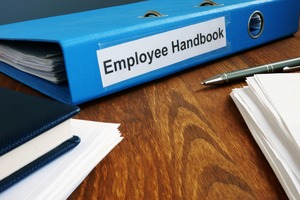
For both employees and employers, understanding these implications of an employee handbook is essential to avoid misunderstandings or legal exposure.
Why Handbooks Matter
Many employees think of a handbook as a reference for vacation days, dress code, or office conduct. While that’s true, handbooks can also serve as formal statements of company policy. Courts may view the handbook as evidence of an employer’s commitments or obligations. In some cases, the policies outlined in a handbook can create contractual obligations, even in an at-will employment state like New York.
For employees, this means that a handbook could influence how disputes are handled.
For example, if the handbook promises a specific process for handling complaints or disciplinary actions, an employer may be expected to follow that procedure. Ignoring the handbook could strengthen an employee’s case if a legal dispute arises.
At-Will Employment vs. Contractual Language
New York is an at-will employment state, meaning employers can generally terminate employees for any reason that isn’t illegal. However, employee handbooks sometimes include language that conflicts with at-will employment.
Phrases like “employees will only be terminated for cause” or “employees are guaranteed progressive discipline” may be interpreted by a court as creating a contractual obligation.
Employers should be careful to clarify that the handbook is a guideline and does not alter at-will status. Employees, on the other hand, should read handbooks carefully and understand which provisions are policy and which might create enforceable rights.
Policies Covered in Handbooks
Handbooks often include policies on topics such as:
- Workplace conduct and behavior
- Attendance and leave policies
- Anti-discrimination and harassment procedures
- Benefits and compensation
- Disciplinary procedures and termination
In New York, certain policies carry additional weight. Anti-discrimination, harassment, and retaliation procedures must comply with state and city laws. Employers are legally obligated to investigate complaints and take appropriate action. Employees who feel their rights have been violated may reference the handbook as evidence that the employer failed to follow established procedures.
Social Media, Confidentiality, and Arbitration
Handbooks also often cover social media use, confidentiality agreements, and dispute resolution procedures. These policies can affect your rights in important ways.
For instance, a handbook may require employees to arbitrate disputes rather than go to court. Confidentiality clauses may restrict what employees can share about the workplace or their own employment disputes.
Handbooks offer guidance on real-world issues employees face daily.
What Employees Should Do
It’s important to read your handbook carefully and understand your rights and obligations. If you have questions about a policy, especially one that limits your rights, affects compensation, or addresses complaints, it may help to seek legal guidance. Understanding the handbook can prevent mistakes, protect your rights, and clarify how to handle workplace issues.
Moving Forward
Employee handbooks are powerful documents that can influence your job and your rights. If you have questions about a handbook, believe your employer is not following its policies, or face any employment dispute, contact Borrelli & Associates, P.L.L.C.



















